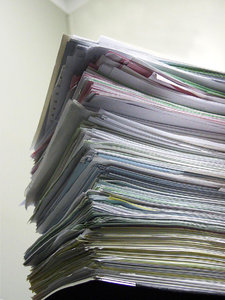Getting Record-Keeping Financially “Sorted”

Heading towards the end of another financial year the issue which usually dominates people’s minds is:
The Tax Return.
Tax season has a way of reminding all of us of our shortcomings in our record-keeping….accounts to be updated, receipts to be found, statements to collect and file…
So here are some good tips for getting financially sorted – in the document keeping sense that is.
- Get rid of old paperwork as you come across it.
You have to keep tax records for 7 years, but beyond tha it is your choice. And all those old credit card and bank statements – which you can now access online anytime you like – do you need to keep those? Getting rid of excess clutter and old paper records is an excellent first step in keeping your records “sorted”. - Go paperless.
While paper documents have their uses for sure and the world is definitely not going paperless, one of the best ways to stay sorted is to reduce future paper flow where you can. Apart from helping to de-clutter your house, a key advantage of electronic documentation is the ability to search for it by name on multiple devices. That is way better than pulling out cob-web covered shoeboxes from under the hallway stairs…but there is an even better reason: By opting for electronic document delivery instead of allowing these documents to pass through the mail, you’ll lessen your risk for identity theft and other types of financial fraud. (Of course, that's only true if you've taken the necessary steps to protect yourself online, such as downloading the latest version of your browser and Internet security software, as well as maintaining robust passwords.) Which brings us to the next key point… - Use a password manager.
If you're conducting more of your financial business online--and most of us are, for convenience reasons as much as a desire to stay organized - keeping track of so many user names and passwords can be cumbersome. Of course, you can do it the old-fashioned way, by tracking this information in a document of all of your account information that is itself password-protected. The downside is that you'll still be responsible for changing those passwords periodically, which is not something most people get around to doing. You can get free quality software which securely stores your online account information and passwords on your computer and smartphone, and regularly update your password for you. One we like is Lastpass https://www.lastpass.com/ - Keep important paper information safe (but accessible).
Nothing is better really than having a home safe or fireproof box for the really important documents (passports, birth certificates and so on), and a file cabinet for the returns and papers, which must still be kept. - Develop and maintain a master document.
A master document – whether it is a folder full of papers or one composite “Word Document” or Excel spreadsheet with all the important information like account numbers and who you have insurance policies with is necessary to stay organised. Not only can such a document serve as an invaluable reference point for you as you manage your affairs, but it can also provide a guide for your loved ones if, for some reason, they need to assist with your financial affairs at some later date. Whatever you do, plan to keep your master directory safe, preferably in that fire-proof safe you are about to buy. Keep an online copy in a cloud storage space or email it to yourself.
Sorted - Your Independent Money Guide
- Last updated on .